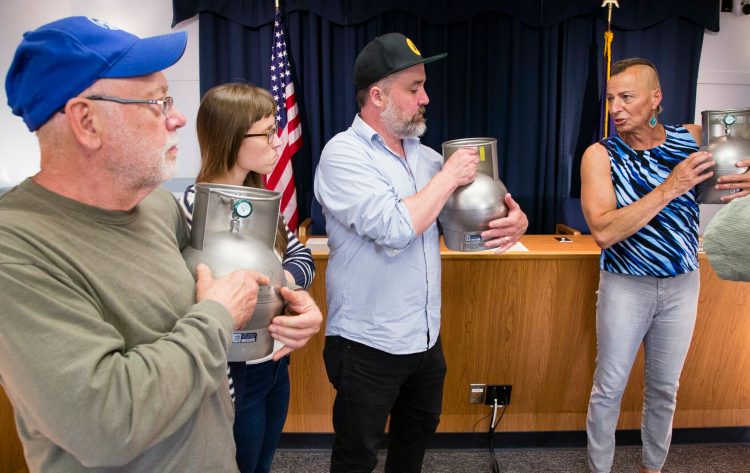SOUTH PORTLAND — For much of the last decade, Barbara Saulle has tracked the foul odors that emanate from nearby petroleum storage tanks and intermittently envelope her family’s home on Elm Street.

A South Portland resident opens and closes the valve of an air collection canister during the training that South Portland residents got Monday to monitor air quality around the city. Carl D. Walsh/Staff Photographer
Her family has suffered a variety of health complaints that Saulle attributes to tank emissions recently flagged in a federal lawsuit. Her cellphone is stacked with photos of a visible haze that sometimes appears around the massive tanks at night.
When the stench of heated asphalt or No. 6 heavy residual fuel oil gets bad enough, Saulle said, she reports it to the authorities or to Global Partners LP, the company that owns a tank farm near her home on the Fore River.
On Monday evening, Saulle left City Hall carrying a vacuum canister that will allow her to capture what she smells in her residential neighborhood off Broadway and have it analyzed by scientists with the Maine Department of Environmental Protection.
“I’ve been documenting the odors for years,” Saulle said. “I hope to catch what’s in the air and find out what it is.”
Saulle is one of more than 40 residents who attended a training session and signed up to participate in a voluntary outdoor air quality monitoring program that will take place across the city over the next eight weeks, City Manager Scott Morelli said. Five of the residents went home with so-called “grab canisters” Monday night.
The U.S. Environmental Protection Agency knew for years that Global Partners had been exceeding its emissions limits under the Clean Air Act, but South Portland officials were surprised to learn about the violations when the EPA filed a lawsuit in March. They have since learned that Sprague Energy also was cited for air quality violations at its Fore River tank farm.
The voluntary air testing program is being done in tandem with the Maine DEP’s installation of six permanent monitoring stations across the city this month. The stations will sample outdoor air quality over a 24-hour period each week for at least one year.

South Portland residents listen as City Manager Scott Morelli, Mayor Claude Morgan and Maine DEP Senior Chemist Danielle Twomey conduct a session Monday to train residents to use portable air collection canisters. Air quality will be monitored around the city by residents and analyzed by Twomey and her staff. Carl D. Walsh/Staff Photographer
Danni Twomey, senior environmental chemist with the DEP, explained the goals of the voluntary air-quality testing program and demonstrated how to use the 6-liter, stainless steel tanks.
Six clean tanks will be distributed each week and collected the following week to be analyzed in a state lab. Tanks will be allocated to each of the city’s five voting districts and the Fire Department.
Twomey said this is the first time the state agency has worked with city residents to monitor air quality across a community. It’s being done at no cost to the city, as an extension of the Maine DEP’s ongoing air-quality monitoring program that samples air at six sites every six days across the state.
Twomey said the permanent air sampling stations also will save the city money because Maine DEP scientists are building them from component parts that will cost $15,000 per device – about half the cost to buy a single device.
Twomey noted that air samples gathered by residents and the stationary devices will measure pollutants to a level of 50 parts per trillion molecules tested. Residents were advised to write detailed notes when they take air samples, describing the exact location, date, time and weather factors that might influence a capture.
“I hope everyone goes into this with an open mind,” Twomey said. “I gather facts and I find truth.”

Maine DEP Senior Chemist Danielle Twomey, left, answers questions for South Portland resident Barbara Saulle while resident Scott Duncan listens during Monday’s training session for using air collection canisters. Carl D. Walsh/Staff Photographer
Twomey pointed out that we all breathe in trace amounts of pollution every day, much of it produced by motor vehicles. Results from the voluntary testing program and the permanent monitoring stations will be analyzed and released to the public as they become available.
Saulle is looking for accountability as well as answers. She has lived in South Portland all her life, and near to Global Partners’ tanks for 12 years.
“I want them to know what they’ve been doing to people and to take responsibility for it,” Saulle said.
For more information on the voluntary testing program, contact City Manager Scott Morelli at smorelli@southportland.org.
Comments are not available on this story.
Send questions/comments to the editors.


